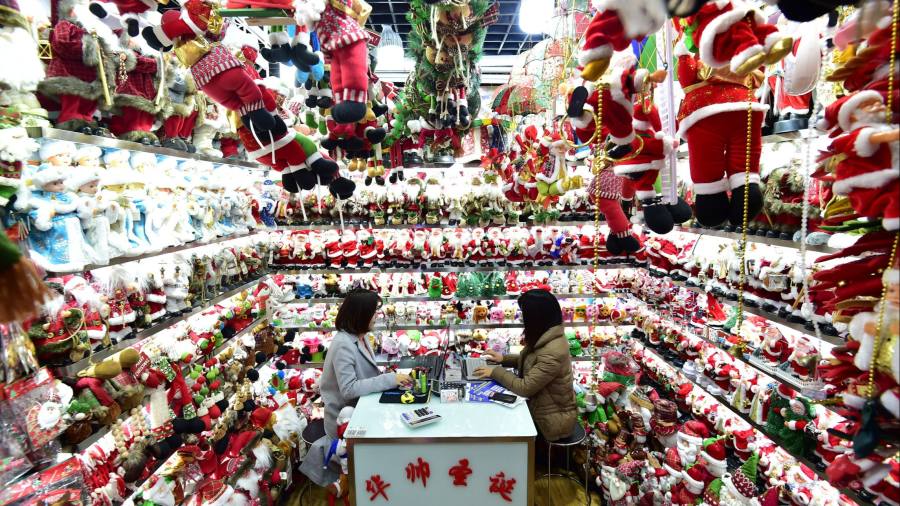In the Chinese city of Yiwu, home to the world’s largest wholesale market for small manufactured goods, socks exporter John Zhu is heartened by the rising number of Russian traders willing to settle their bills in renminbi.
“Russia’s break-up with the west leaves the country no choice but to rely on the renminbi to keep its economy afloat,” said Zhu, noting that clients in Moscow sent renminbi payments via WeChat, the Chinese social media app. “We are a beneficiary of the trend.”
With its 75,000 stores, Yiwu has been nicknamed China’s trinket town, the centre of a multibillion-dollar trade in everything from Christmas decorations to toys and umbrellas to pencils.
It is also at the heart of a decade-long experiment to internationalise the renminbi as Beijing seeks to strengthen the role of the world’s second-largest economy in the global financial system. While progress has been slow, more people are settling contracts in the renminbi since Moscow was cut off from dollar financing by western sanctions following its invasion of Ukraine, traders in Yiwu said.
There has been a fivefold surge in annual renminbi trade settlement since 2019 in Yiwu to about Rmb56.5bn ($8bn) last year, according to official statistics. This far outpaced the national average, which increased more than 80 per cent in the same period.
“Yiwu is leading the pack in China’s efforts to make the renminbi an international currency,” said Dan Wang, chief economist at Hang Seng Bank China.
Just over a tenth of trade in the export hub last year was settled in the Chinese currency, with the dollar accounting for more than 80 per cent of trade, according to official statistics. China’s export-oriented renminbi trade settlement accounts for less than 7 per cent of total exports, compared with almost 12 per cent in Yiwu, said an adviser to the central government on foreign policy.
Beijing has encouraged renminbi use and by the end of last year, it had signed currency swap agreements with 40 countries including Argentina and Brazil. The swap agreements allow central banks to provide renminbi liquidity to commercial banks in the event of a shortage, helping shore up confidence among companies nervous about conducting trade in China’s currency.
Several factors have influenced the rising use of the renminbi in Yiwu, not all of which can be easily replicated.
Yiwu was one of the first cities in China to allow individual merchants to settle larger cross-border deals in renminbi. Most cities have an annual cap of $50,000. Given Yiwu’s reputation for cheap goods and flexible terms, helped by the fact that wholesalers do not pay either corporate tax or market rent, exporters have sufficient bargaining power to request settlement in renminbi.
“When you have only one place to go to purchase something, the seller sets the terms on how transactions are settled,” said James Wu, a Yiwu-based furniture exporter who began demanding renminbi payments from Middle Eastern clients last year.
Yiwu has long had strong trading connections with emerging economies, more open to dealing in the renminbi, traders said.
Senegalese trader Mouhamadou Pouye largely eschews the US dollar to settle most of his trade in renminbi. “I can’t say renminbi is going to replace the US dollar,” said Pouye, who buys Chinese electronics and medical equipment in Yiwu to sell in his native Senegal. “But the amount of dollar transactions is getting lower and lower year by year.”
Analysts have warned, however, that limited offshore reserves and China’s stringent capital controls will limit the renminbi’s adoption. “The institutional support for renminbi to go global is not strong enough,” said Tan Xiaofen, a finance professor at Beihang University in Beijing.
To spur greater global use, China would need to relinquish control over the renminbi’s exchange rate and drop capital controls, allowing the currency to circulate freely, as with the dollar. But policymakers prize those controls and have shown little willingness to give them up.
Many foreign central banks have stockpiled their renminbi reserves for emergencies such as paying down foreign debt, according to a Beijing-based adviser to the People’s Bank of China. “Some policymakers in developing countries don’t want to make full use of offshore renminbi even when local merchants are keen to do so,” the person said.
The lack of renminbi settlement abroad means many Yiwu merchants use underground money shops, which exchange currencies such as West Africa’s CFA franc for renminbi at low cost, to facilitate trade.
Wu, the furniture exporter, said a quarter of his renminbi sales were paid out through third-party brokers.
Such arrangements carry their own pitfalls. Authorities have frozen tens of thousands of bank accounts belonging to Yiwu merchants in recent years over money laundering risks, according to local lenders and state media reports.
Rising trade with Russia in the wake of the Ukraine conflict can also bring compliance issues. “If we get caught by the US government for a Rmb200,000 trade settlement with Russia that breaks sanction rules, we may get a fine of Rmb2bn,” the official said.
Other obstacles are more prosaic.
Back at his stall in the giant Yiwu International Trade City, Zhu, the socks exporter, said he stopped seeking renminbi payments from an Ethiopian client this year because the lack of currency reserves meant he had to wait a long time to obtain renminbi.
“I am not going to wait for an extra three weeks to receive renminbi when I can get paid in dollars right away,” he said.
Read the full article here




